- The Appalachian Spirit: 49 Winchester at Two Step Inn Festival 2024
- Wyatt Flores at Two Step Inn: Photos and Review
- Legendary Neal McCoy at Two Step Inn: Review and Photos
- Mark Chesnutt at Two Step Inn: Photos and Review
- Rising Star Sadie Bass Shines at the Faster Horses Festival
- Sawyer Brown at Faster Horses: A High-Octane Celebration of Four Decades
Paula Boggs: A Taste of Seattle Brewed Soulgrass
Paula Boggs is a musician. She has been a musician since she was very young. However just as John Lennon wrote “Life is what happens to you while you’re busy making other plans,” different life opportunities arose and the music faded into the background for many years. Life may not have been as musical, but as she recently told me “It’s never dull.”
First there was a law degree to achieve, and a commitment to the U.S. Army. Is there a better way to conquer a fear of heights than to become a paratrooper and jump out of planes? Once she landed back on the ground, there was a job as a staff attorney for the White House, a stint as a United States attorney, Senior Deputy Counsel for the Dell Corporation and oh yeah, Chief Counsel for a Seattle based company by the name of Starbucks. You may have heard of it.
After spending thirty years breaking glass ceiling after glass ceiling, music came back into her life as a form of comfort in dealing with a family tragedy. It didn’t take Paula long to realize finding music again was putting her in touch with what she calls her “true north.” Just as she has followed her own dream, she hopes to inspire others to do the same.
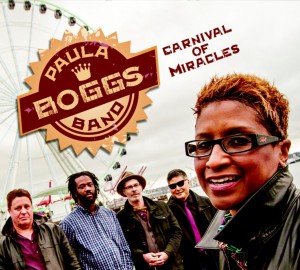 Her latest album Carnival of Miracles, is a statement of those dreams along with some acute observations of the world around us. The album has made it into the first round of 2016 Grammy balloting in several categories, as have the videos for the title song and the remix of “Look Straight Ahead,” a powerful look at urban culture.
Her latest album Carnival of Miracles, is a statement of those dreams along with some acute observations of the world around us. The album has made it into the first round of 2016 Grammy balloting in several categories, as have the videos for the title song and the remix of “Look Straight Ahead,” a powerful look at urban culture.
I recently had the opportunity to speak with Paula Boggs about her old life, her new life and “Seattle Brewed Soulgrass.” Sit down and have a taste.
Kath Galasso: How is the tour going?
Paula Boggs: We had a great week last week in D.C. and New York. We’re back on the West Coast playing two gigs in Washington, and then we’re going to the Midwest to Detroit, Chicago and St. Louis before coming back to the West Coast. Yeah, a lot of shows between now and the end of 2015, and we’re building our tour calendar for 2016.
Well I hope you get back to the Northeast because I missed you this time in NYC.
We would love that, we definitely would. New York is special. Actually there are emotional reasons why we want to return. The title song of the album “Carnival of Miracles,”was inspired by the Newtown tragedy and we thought we might have a chance to go to Newtown to play there, but the logistics didn’t work out. So, we remain hopeful in 2016, we’ll be able to play for the Newtown community. We really want to do that.
You have described yourself in your life as a mountain climber and a builder. You’ve certainly climbed higher and built more than you could have imagined growing up. Your resume is beyond impressive, but were there some mountains along the way that you weren’t able to climb, where you had to change your vision?
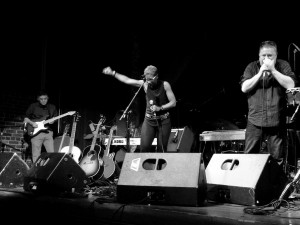 Oh absolutely. There was an opportunity for me actually last week in D.C., to share this story with a group of women in the Defense industry. And what I told them was despite what on paper appears to be this stellar legal career without struggle, the fact of the matter is I almost did not become a lawyer because of failing the bar. It was an incredibly emotionally trying and embarrassing time in my life because I was in a scholarship program that hinged on me becoming a member of the bar.
Oh absolutely. There was an opportunity for me actually last week in D.C., to share this story with a group of women in the Defense industry. And what I told them was despite what on paper appears to be this stellar legal career without struggle, the fact of the matter is I almost did not become a lawyer because of failing the bar. It was an incredibly emotionally trying and embarrassing time in my life because I was in a scholarship program that hinged on me becoming a member of the bar.
I had a four year military commitment hanging over my head, and every single day I was not a member of the bar I feared I’d be kicked out of the honors program, and who knows what would happen with me within the military. Despite all of that I had to pull myself together and show up every day, and try to do my best work. A part of that led to me working for a woman in the Pentagon who became very impressed with my work. So as the clouds were closing in on me, I actually cornered this woman in the Ladies room and asked if I could work directly for her. She was not a lawyer, so working for her did not require being a member of the bar. Because she knew my work and was impressed by it, she took a chance on me. It was that risk taking, plus the belief that someone else had in me that led to the path, literally if you string it together, leads to me becoming General Counsel of Starbucks. Because at the end of the day, if I had passed the bar the first go-round, I never would have had that conversation.
The moral of the story is, failure is a given, we all fail. It’s human to fail. The rubber hits the road in how we deal with failure when it happens.
You are definitely an example of how a well-rounded childhood can lead to a well-rounded life. While you grew up being exposed to different religious teachings and moving to Europe as a young teenager, there music was a constant in your early life. Then you basically gave it up for thirty years. Was there no place in your corporate life for it, or would the pull of it have been too much of a distraction?
I think the way I looked at the world as a seventeen year old is not terribly different from how a lot of people of my generation did. Which is different from my sense of Millennials. I really thought it was either or, that I had a binary choice in front of me. It was either you pursue the academic route or you pursue the music route. From where I sit today I know, I’ve learned that’s nonsense, and it was nonsense back then. But I didn’t understand that as a seventeen year old.
You have a video out called “True North,” where you talk about your life, career, and finding your “true north.” In the entire video not once do you talk about being a woman or being black in referring to your achievements. As a fellow Boomer who was there as the fight for equality on all the levels was occurring, the omission really struck me that you felt it was unnecessary to acknowledge either. It actually made me smile.
[youtube]https://youtu.be/RaKDfMTsNIU[/youtube]
I think part of my mindset when it comes to the myriad of underrepresented minority groups I’m a member of, I mean there are several of them, is again great parenting and having the benefit of amazing role models from day one. For example, my mother is also African American and female and it never occurred to her that either of those things ever stood in the way of her achieving whatever it was she was going after. My mother is the woman who in 1972, took herself and her four children out of the segregated South to Germany and we landed in Frankfurt, Germany not knowing what city in Germany we would be living in. That’s my mom. Even the experience of being a Roman Catholic in the segregated South, Catholics were underrepresented minorities in the segregated South, and yet the example of the nuns, at least as a little kid sees them, is they were women of power whose standard was excellence.
And on my father’s side of it, I was in the environment of a historically black college, Virginia State. So the black kids I was around in my father’s world were the children of professors and instructors at Virginia State. So it was a community of high achieving African-Americans. So all of those things come together for me. Even my grandparents were a product of the great migration from the South to the North, for African-Americans that’s our immigrant story. They came and they had nothing and yet they became relatively successful small business people. So these were the people whose experiences imprinted me as a little kid.
Let’s talk about your music. “Seattle Brewed Soulgrass” is the name you’ve come up with for your musical style which pulls from Jazz, Rock, Soul and the Blues. It’s a great term, how did it come about?
I think the best way to describe it is, our sound is influenced by the ethos of Seattle music, if you will, which is challenging traditional notions of genre and coming up with sounds and styles that you might not find anywhere else. I don’t really care what genre it is, it could be 90s Grunge to Macklemore to Quincy Jones to Jimi Hendrix. There’s a certain ethos about Seattle music that I wanted to share and be a part of, and that term helps me do that. The brewed is a nod to Starbucks of course, but it also a nod to the fact that we’re trying to be part of a tradition of Seattle music. And then Soulgrass is a way to sort of capture the fact that our music has strains of Folk, Rock, Soul, Jazz, Blues, Bluegrass and Gospel, all entwined. Depending on the song, it could tip more heavily in any of those directions. It’s the fusion of many genres that leads to a sound that hopefully is uniquely ours.
“Look Straight Ahead,” while not written specifically about Ferguson, certainly serves as a cautionary tale for young black males. It’s very impactful. You’ve done a remix with Seattle rap artist J. Pinder on it. How did that collaboration come about?
[youtube]https://youtu.be/TKwzivB2PMw[/youtube]
It was magic. It was absolute magic. I had a vision of rewriting “Look Straight Ahead,” to make it more current, more relevant. Part of that was changing a chorus. I rewrote many of the lyrics and then I had the inspiration there’s a way to make this song even more relevant and that is to remix it and partner with a Hip Hop artist. So consistent with the whole vibe of Seattle Brewed Soulgrass, I wanted to find a Seattle rapper, and not just because of what I said before about the Seattle music scene, but I wanted to make a few other points. A lot of Hip Hop that comes out of Seattle, not all of it, but there’s a lot of what I call “consciousness rap.” Rap, not about cars and women and what not, but Hip Hop that has a message around “where are we in this world? And what are we going to do about it,” which I really dig.
The other thing I wanted to do with selecting a Seattle rapper was, these issues we’re talking about, they’re not just about Ferguson or New York, they’re also about Seattle. These issues are here. And despite Seattle being one of the most affluent, one of the whitest cities of its size in the United States, it still has these issues. So I thought by partnering with a Seattle rapper, I could make that point too.
Then the question became who. I literally googled up-and-coming Seattle rappers and Justin Pinder’s name was among those. I came across a video of him with Dr. Dre, and Dr. Dre was lauding him as one of the best of this new generation of rappers. Then I said “J. Pinder, why is that name familiar?” As it turned out, I already had his music. I had bought one of his CDs through one of my fellow members of the KEXP board. I’m on the board of public radio station KEXP and one of my fellow board members at the time owned a record company and J had recorded his record through my colleague. So I reached out to my colleague and he introduced me and J. Pinder. I explained what I was trying to do and sent him the song. Justin came back to me and said “I’d love to work with you. Your story could have been my story. I used to ride the bus as a teen in Seattle, from the hood to school and back. I get what you’re trying to do.”
I told him about my vision of collaborating with The White House, My Brother’s Keeper, and potentially other non-profits focused on these issues. Issues such as the relationship between police and youth of color, sentencing reform, opportunities for young black and brown men in the United States, and he said “I want to be part of that.”
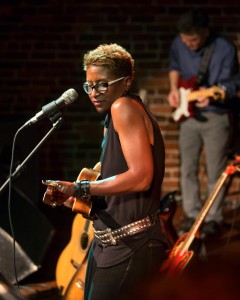 You’ve had many musical influences ranging from Leonard Cohen to Bill Withers and even Neil Young. In fact, you cover Young’s “When You Dance (I Can Really Love)” on this album. Your version takes it over to a bluegrass feel. Why this song and where did the bluegrass arrangement come from?
You’ve had many musical influences ranging from Leonard Cohen to Bill Withers and even Neil Young. In fact, you cover Young’s “When You Dance (I Can Really Love)” on this album. Your version takes it over to a bluegrass feel. Why this song and where did the bluegrass arrangement come from?
I have loved Neil Young since I was a little kid. His Heart of Gold album was one of the things that got me through seventh grade. I’ve always loved the Neil Young way to be a musician which to me has always been hugely authentic. So it’s not just that I’ve loved Neil Young’s music for many, many years, I’ve loved what Neil Young stood for as a musician. So then came the question is there a Neil Young song we could cover that would honor all these things. I’ve always loved the song “When You Dance (I Can Really Love)” and it struck me that his lyrics were ironic. It’s not a joyful song when he sings it or how it is arranged when he does it. But I thought there was an opportunity to take those lyrics at face value and rather than have them be irony, to have them be celebratory. With that change, it could fit really, really nicely into this whole Soulgrass thing that we’re doing.
So I started experimenting with different instrumentations and tempo, which led to what you hear on the record. What it really amounts to is a very celebratory song with almost Gospel influences surrounding the bluegrassy feel that we came up with.
Last question. Even though your “true north” is now focused on your music, you haven’t completely walked away from the corporate world. You serve on many boards and committees, including the President’s Committee for the Arts and Humanities, the Peabody Conservatory National Advisory Board and formally on the Board of the School of Rock. You speak out strongly of the need for music and the arts in our schools. Are we seeing any progress in government funding or are we now at that tipping point where it all needs to be done through the private sector?
One of the boards you are referring to is the President’s Committee for the Arts and Humanities, and certainly in the time I’ve served on that committee, the primary focus has been on a program which is a public-private partnership which is called Turn Around Arts. It is really focused on helping change the conversation, really documenting the relationship between kids, particularly instrumental in schools having art education, music, fine arts, dance, and the relationship between that and PET scores, increases in school attendance, decreases in disciplinary issues and the like. And I think at the end of the day, it will require a partnership between the private sector and government at all levels to move the needle and making the arts more available in more school districts across the country. It’s not just an urban issue; it’s equally relevant in suburbia, rural America, Indian reservations and the like.
Interview by Kath Galasso @KatsTheory
Photos except album cover by Betty Udesen
Album cover photo by Tom Reese
Grammy First Round Accepted Entries:
- BEST AMERICAN ROOTS SONG: Carnival of Miracles
- BEST AMERICAN ROOTS PERFORMANCE: Carnival of Miracles
- BEST ENGINEERED ALBUM NON-CLASSICAL: Carnival of Miracles
- RECORD OF THE YEAR: Carnival of Miracles
- ALBUM OF THE YEAR: Carnival of Miracles
- SONG OF THE YEAR: Carnival of Miracles
- BEST NEW ARTIST: Paula Boggs Band
- BEST MUSIC VIDEO: Carnival of Miracles
- BEST MUSIC VIDEO: Look Straight Ahead Remix, featuring J. Pinder
2 Comments
You must be logged in to post a comment Login
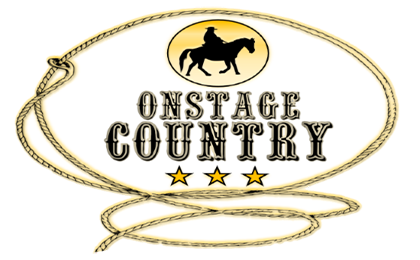
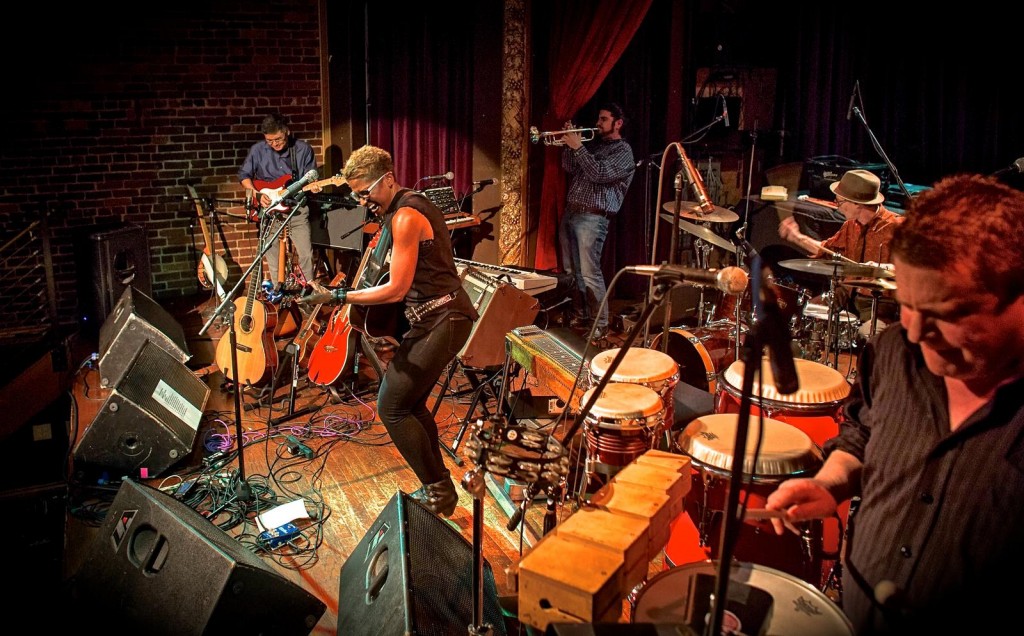
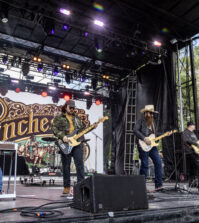
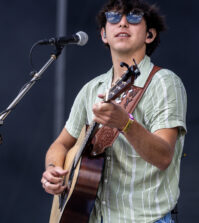
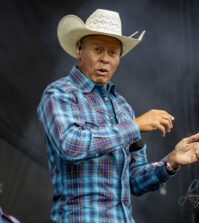
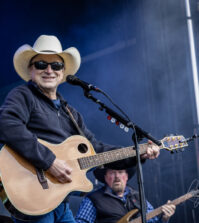

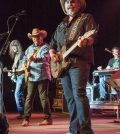
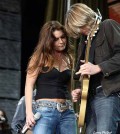
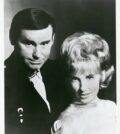
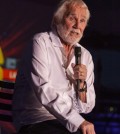

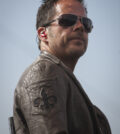





Pingback: Paula Boggs: A Taste of Seattle Brewed Soulgrass – Paula Boggs | Musician, Businesswoman, Writer, and Speaker
Pingback: Paula Boggs: A Taste of Seattle Brewed Soulgrass - Paula Boggs | Musician, Businesswoman, Writer, and Speaker